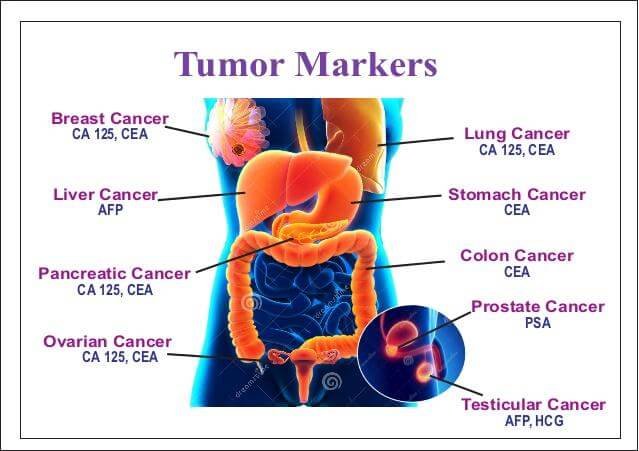What is CEA tumor marker?
CEA – Carcino Embryonic Antigen is a tumor marker. Tumor markers are substances produced by cell- either normal or cancer cells. Normal cells produce tumor markers in much lower levels as cancer cells. For this reason, elevated levels of tumor marker can be a sign of cancer.
There are many different tumor markers that are associated with one or more types of cancer. CEA marker is mostly associated with colorectal cancer, but it is also present in other types of cancer.
CEA is a glycoprotein. Its production is encoded by the CEACAM-5 gene. CEA protein is a part of immunoglobulin family and it is believed to have a role in immune processes. It can be detected in blood, as well as body fluids and tissue [1].

 CEA normal ranges
CEA normal ranges
CEA levels can be measured by performing blood tests. The normal range for adult non-smoker is < 2.5ng/ml. In adult smoker normal range is higher- <5.0 ng/ml. Some conditions besides cancer can cause increase in CEA levels. In this case the levels of CEA are not normally over 10 ng/ml. In case of cancer, the levels are usually over 20 ng/ml. CEA levels can be used to assess prognosis, stage the cancer and monitor the treatment [1].
Causes of elevated CEA levels
Increase in CEA levels can be caused by various conditions:
- Liver disease- cirrhosis, chronic hepatitis, viral hepatitis, obstructive jaundice (see Reye disease)
- Chronic kidney disease
- Pancreatitis
- Irritable bowel syndrome
- Diverticulitis
- Respiratory diseases- pneumonia, pleuritis
- Smoking
- Radiation and chemotherapy can cause increase of CEA due to cell death.
Many different types of cancer can cause increased CEA levels. These include:
- Gastrointestinal cancers: colorectal, stomach, esophageal cancer (see carcinoid cancer and tubovillous adenoma)
- Lung cancer
- Mesothelioma
- Medullary thyroid carcinoma
- Skeletal metastases
- Breast cancer [2]
Colon cancer
CEA tumor marker is helpful when staging the cancer and monitoring the progress of treatment. Since the marker is not highly specific or sensitive, it can´t be used as a screening method.
- High CEA levels are associated with advanced colorectal cancer therefore increased levels are a bad prognostic factor.
- CEA levels, together with other tumor markers are used for staging the cancer. It can assist in planning the treatment of the cancer.
- Biggest role for CEA tumor marker in colon cancer is monitoring the treatment. CEA levels return to normal within 4-6 weeks after surgical resection of the tumor. If CEA levels begin to rise after some time, it can suggest relapse of the cancer [3].
Lung cancer
CEA sensitivity is insufficient for it to be used as a method of screening for lung cancer. In lung cancer CEA levels also predict an advanced disease. After surgical resection of lung cancer, CEA levels should normalize. If there is tumor relapse, the CEA levels will also start to increase.
Usually the rise of CEA levels is present 6 to 12 months after surgery. It is advised to monitor CEA levels every three months. It has also been discovered, that CEA levels have no indication towards the volume of lung cancer or its metastases [4].
Conclusion
CEA tumor marker has been widely used for staging and monitoring colorectal cancer, as well as a prognostic factor for the outcome. In other types of cancer the usefulness of determining CEA tumor marker, either separately or in combination with other markers, is still being investigated.
If you found this article helpful, share it on social media. For your comments and personal experience use the comments section below.
References
- What are tumor markers: https://www.cancer.gov/about-cancer/diagnosis-staging/diagnosis/tumor-markers-fact-sheet
- Causes of elevated CEA: http://patient.info/doctor/carcinoembryonic-antigen-cea
- CEA in colorectal cancer: http://www.cancernetwork.com/oncology-journal/cea-monitoring-colorectal-cancer
- CEA in lung cancer: http://onlinelibrary.wiley.com/doi/10.1002/cncr.2820360623/pdf
Similar Posts:
- Brenner Tumor
- Krukenberg Tumor
- Klatskin Tumor
- Link Between Low Testosterone and Testosterone Replacement Therapy on Cancer
- Pineal Gland Tumor
- Choriocarcinoma – Symptoms, Prognosis, Treatment, Diagnosis
- Tumor Suppressor Genes






Leave a Reply